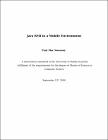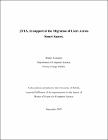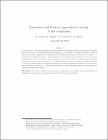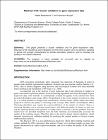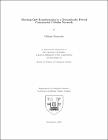Browsing Computer Science Technical Reports by Title
Now showing items 141-160 of 280
-
Java Decaffeinated: experiences building a programming language from components
(Trinity College Dublin, Department of Computer Science, 2000-06)Most modern programming languages are complex and feature rich. Whilst this is (sometimes) an advantage for industrial-strength applications, it complicates both language teaching and language research. We describe our ... -
Java RMI in a Mobile Environment
(Trinity College Dublin. Department of Computer Science, 2004-09)There are many problems that must be addressed when attempting to enhance a particular middleware programming framework, in this case Java RMI, to allow it operate effectively in a mobile environment. The Architecture ... -
JFS: A Secure Distributed File System for Network Computers
(Trinity College Dublin, Department of Computer Science, 1999-03)Network-centric computing aims to solve the problems associated with traditional client/server systems, namely the high performance requirements, and costly maintenance of, the computing resources. With the network-centric ... -
Journey Time Estimation Using Route Profiles
(Trinity College Dublin. Department of Computer Science, 2004-09)Estimating journey times is of increasing importance in the modern world for the fulfilment of social and business occasions. Probably the most variable journey times are the times experienced when using a road network. ... -
JXTA, In the Support of User Migration Across Smart Spaces
(Trinity College Dublin. Department of Computer Science, 2002-09)?Smart Spaces? are environments with traditional computing hardware as well as embedded computers, information appliances, and multi-modal sensors. The goal of a smart space is to sense, recognise and understand the tasks ... -
Knowledge Engineering in a Real World Case-Based Reasoning Application
(Trinity College Dublin, Department of Computer Science, 1999-05)Case-Based Reasoning (CBR) has emerged from research in cognitive psychology as a model of human memory and remembering. It has been embraced by researchers of AI applications as a methodology that avoids some of the ... -
Knowledge Engineering Requirements in Derivational Analogy
(Trinity College Dublin, Department of Computer Science, 1996-08)A major advantage in using a case-based approach to developing knowledge-based systems is that it can be applied to problems where a strong domain theory may be difficult to determine. However the development of case-based ... -
Knowledge Engineering Requirements in Derivational Analogy
(Trinity College Dublin, Department of Computer Science, 1993-09)A major advantage in using a case-based approach to developing knowledge-based systems is that it can be applied to problems where a strong domain theory may be difficult to determine. However the development of case-based ... -
A Knowledge-Light Mechanism for Explanation in Case-Based Reasoning
(University of Dublin, Trinity College. Department of Computer Science, 2005-10)Decision support systems are currently achieving higher classification accuracies by using more complex reasoning mechanisms. Examples of such mechanisms include support vector machines and neural networks. However in ... -
Kronecker?s and Newton?s approaches to solving : A first comparison
(Trinity College Dublin, Department of Computer Science, 1999-09-29)In these pages we make a first attempt to compute efficiency of symbolic and numerical analysis procedures that solve systems of multivariate polynomial equations. In particular, we compare Kronecker?s solution (from the ... -
Limitations of Scientific Ontology
(Trinity College Dublin, Department of Computer Science, 1992-04)Artificial life is a new multi-disciplinary science which is emerging from established practices in artificial intelligence, computational biology, and cybernetics. It is argued in this paper that conventional scientific ... -
The Limits of CBR in Software Project Estimation
(Trinity College Dublin, Department of Computer Science, 1999-03)Software project cost estimation is difficult because of problems of quantifying project size and because of the continual emergence of new technology. This presents as a classic example of a weak theory domain where ... -
Machaon CVE: Cluster validation for gene expression data
(Trinity College Dublin, Department of Computer Science, 2003-12-08)This paper presents a cluster validation tool for gene expression data. Machaon-CVE (Clustering and Validation Environment) system aims to partition samples or genes into groups characterised by similar ... -
Making Personalised Flight Recommendations using Implicit Feedback
(University of Dublin, Trinity College. School of Computer Science and Statistics, 2004-10)As e-commerce has become more popular, the problem of information overload has come to the fore. Recommender systems that reduce the information overload problem are becoming more common. However, the problem with many ... -
MCK: Wireless Communication with Mobile Agents.
(Trinity College Dublin, Department of Computer Science, 1998-06) -
Mechanisms for Context-Informed Adaptive Hypermedia
(Trinity College Dublin. Department of Computer Science, 2004-09)The Cross-fertilisation potential of the work being undertaken by both the Adaptive Hypermedia and Context-Aware communities is considerable. In particular, the benefits to Adaptive Hypermedia constitute a method for ... -
Meeting QoS Requirements in a Dynamically Priced Commercial Cellular Network
(Trinity College Dublin. Department of Computer Science, 2003-09)With the current trend towards user mobility and ubiquitous computing, cellular networks are becoming an evermore important feature of day-to-day life, albeit an unseen one. Mobile networks are characterised by a scarcity ... -
A Metadata Driven Approach to Educational Adaptive Hypermedia
(Trinity College Dublin. Department of Computer Science, 1999-09)The objective of this dissertation is to develop a teaching tool which extends the benefits of Web learning by providing increased flexibility for both students and administrators. The dissertation will investigate the ...





